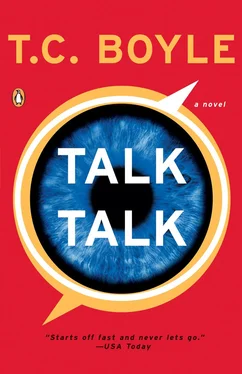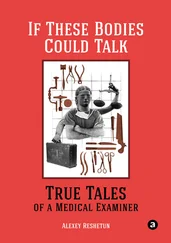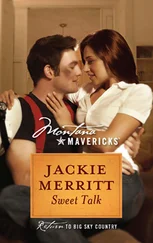“You didn't-”
“No,” he said. “I didn't tell her anything. I just wondered aloud, as a friendly neighbor, if she could tell me where Mrs. Wilson was because she was a friend of my mother's and my mother told me to look her up if I ever got to New York.” He shrugged, toweling his hair with a sweatshirt he snatched out of the tumble of dirty clothes on the backseat. “The usual bullshit. She was old, that's all.”
“And she believed you?”
Another shrug. “Does it really matter at this point?”
She gave him a long look, then dropped her eyes to put the car in gear. She was angry, frustrated, the whole thing boiling up in her-yes, it mattered, of course it mattered-and she accelerated too quickly, the back end shearing away from her on the slick roadway, everything out of kilter suddenly, and though she did manage to avoid the two parked cars on her right, the truck, the bright orange and white moving-truck with the U-Haul logo plastered along its gleaming steel midsection, was another story altogether.
Afterward, her most vivid recollection of the accident wasn't the way her car looked with its trunk radically compressed and jammed up under the belly of the truck as if some negligent giant had been at play with it, but standing there in the rain half a block from Peck Wilson's house-from the thief's house-while a joyless policewoman from the City of Peterskill Police Department tried to put her through the drunk test and Bridger waved his hands and flailed his lips at the bare-chested bodybuilder in shorts and flip-flops who'd rented the truck and left its front end projecting halfway across the street. “I'm not drunk,” she kept saying, “I'm deaf. Deaf. Don't you understand?” And the policewoman kept saying, “Spread your legs, hold out your arms, close your eyes, touch your nose.”
People had emerged from their houses up and down the block and gathered under umbrellas to savor the spectacle, barefooted little girls in shorts and summer dresses knotted behind the neck, their bulging mothers and smirking brothers, an old man in a straw hat. Dana wasn't hurt, nor was Bridger. Thankfully. But she'd been driving and she was the focus of attention, all those shallow shifting eyes judging her, the drunk-or no, worse than a drunk, a freak, a babbler, someone to instinctively shy away from. She knew what they were thinking, knew what they'd say over their hot dogs and coleslaw at dinner that night, a passing reference, the recollection of a little anomaly in an otherwise uniform day: “But she looked just like anybody else, pretty even-until she opened her mouth.”
The policewoman-she was of mid-height, Dana's age, with a rangy, asymmetric build, thick glasses in severe frames, eyes that could have been pretty with a little makeup-finally seemed to come round. Bridger had shifted his attention away from the man with the U-Haul and had stepped in to enlarge her understanding of what Dana was trying to communicate, while her partner, an older guy with fading eyes and hair the color of a lab rat's, hunched over his pad and began writing up the accident report. Dana watched them go back and forth, Bridger nearly as expressive as one of the deaf himself. “The truck isn't where it's supposed to be,” Bridger was saying. “They should never have parked it there in the first place.” The policewoman-Dana saw now that she had a nametag clipped above her breast pocket: “P. Runyon”-didn't seem particularly interested. To her it must have seemed an open-and-shut case, so routine it would have been a snooze but for the spice of the California plates and Dana herself-slick roads, excessive speed, the truck parked and locked and on the other side of the road nonetheless.
She turned abruptly to Dana and said something. What was it? Insurance? Yes, she had insurance-she fumbled through the glove box, her hands trembling, and finally produced the papers-and no, she didn't need to go to the hospital, she was perfectly all right, thank you. P. Runyon didn't seem satisfied. She stalked around in the rain, the water beading on the polished uppers of her standard-issue shoes, alternately glaring at Dana and turning her back on her to sweep the onlookers as if to assure them that things were in hand here, despite appearances, and that they'd all better look out and take a step back or they'd wind up with their cars stuffed under a truck too.
Then it was the tow truck, the crowd dissipating and the patrol car slithering off down the street, a spate of small talk in the solid high cab of the truck and finally the garage with its ancient chemical smells and the once-white shepherd-mix curled up on the floor. The repair estimate? No way to tell yet, but it looked as if the rear axle stub was broken-“Do you see that,” the service manager asked, pointing to where her car crouched against a low wall covered with ivy, “the way the wheels are canted like that?”-and of course there was going to be some fairly extensive body work, both back fenders, trunk, bumper, replace the rear window. By the time it was over, by the time they took a cab to the train station and caught the next southbound train and she was pressed safely up against the window and looking out on the pocked gray hide of the river, it felt as if a week had passed in the course of a single day-and it would be a whole lot longer than that, two and a half weeks, to be exact, before she would get her car back. “And that's night and day,” the service manager told Bridger over the phone at her mother's while Bridger cupped the receiver and translated, “night and day. A real rush job. Because I know how anxious the little lady must be to get back to California.”
In the interval, she tried to relax. Here was an opportunity to spend some time with her mother, work on her book, think things out-and if she was going to teach again she'd better clean up her CV and start making some inquiries, too late at this juncture for a hearing position, and certainly not at the college level, but there were deaf schools in Riverside and Berkeley she might try. If she did want to stay on the coast. She wasn't so sure anymore, wasn't sure about anything. Two months ago she was in love, blissfully involved in her research and her book, secure in her job at the San Roque School and beginning to feel the pull of the environment-mojitos on an outdoor patio in January, a bugless summer, the incalculable gift of the vernal light as it glanced off the stucco walls and red tile roofs of the buildings on campus and rode out to sharpen over the waves. Now she didn't know. Now she was living with her mother, without a car or a job. It scared her how quickly everything had turned against her.
She was being paid through the end of the summer and she'd been issued new credit cards, so she was all right there, at least for a while. Her credit was still a mess, though-she couldn't begin to imagine the depth and breadth of the heap of threatening letters and demand-payment notices piling up in one of those heavy plastic mail carriers in the back room of the San Roque post office, each one of which would have to be addressed at some point. The onus was on her, whether that was her signature on the credit card slip or not-and what did they care? They wanted their money. Period. The victims' assistance woman had gone into dark mode when she talked about the greed of the banks and credit card companies-“Easy Credit, Instant Credit, No Refusamos Crédito”-and how pretty soon everybody would have to have some sort of implant, like the ones they inserted up under the napes of cats and dogs, to prove their identity. Bridger had said, “Just like “1984,”” and the woman gave them a blank look.
But the mail. The mail was a problem. They'd left San Roque in such a hurry she hadn't really planned beyond the moment and so she'd put a four-week vacation hold on her mail delivery. She supposed she should have it forwarded, but that would be a kind of defeat, a giving-in to her mother and the easy way out-and she really didn't want to deal with the mess of her finances. The mail was nothing but bad news, and right now-on a muggy Tuesday afternoon a week after the accident, as she sat at the desk in the spare room of her mother's overstuffed claustrophobe's nightmare of an apartment and fiddled with the knobs on the air conditioner, hoping for just a degree or two of refrigeration-she wanted to focus on other things. Like her book. The laptop was propped open before her, giving back the words she'd dredged up out of herself, the imposture they represented, the incremental silent means of recasting her own uncertain self in Victor's image, in Itard's, but they were old words that slipped and elided and clashed like mortal enemies till she couldn't look at them. ““Wild Child,”” she said aloud, just to feel the buzz of the words on her lips. ““Wild Child,” by Dana Halter,” she said, as if it were an incantation. She repeated herself over and over again, but it was no use. Because in her mind, a husky deep contrarian voice kept saying, “Peck Wilson, Peck Wilson, Peck Wilson.”
Читать дальше












